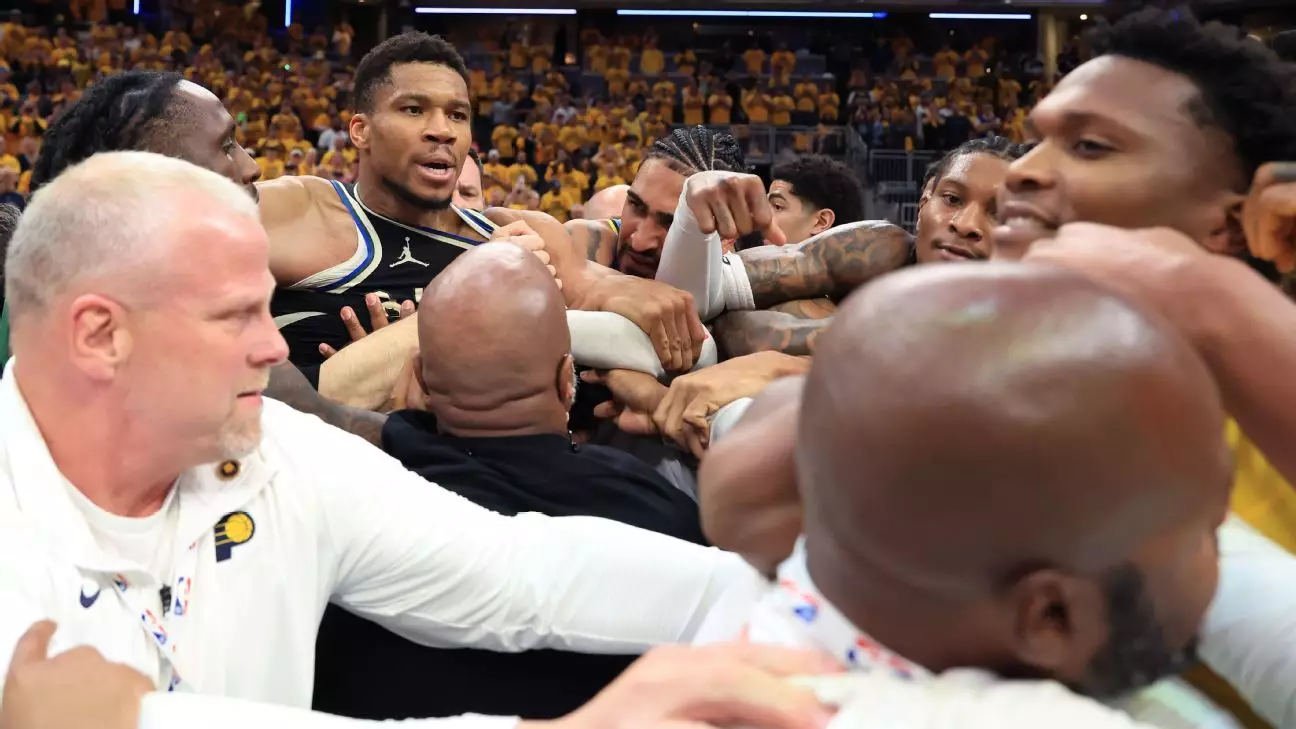In a high-stakes playoff atmosphere where emotions run wild and competition peaks, the embers of passion can ignite into fierce confrontations. Such was the case during Game 5 of the first-round playoff series between the Milwaukee Bucks and the Indiana Pacers. This game, which saw the Bucks eliminated from the postseason, unveiled a deeper narrative worth analyzing beyond mere triumphs and defeats. It revolved around the delicate balance of sportsmanship, respect, and human emotions, culminating in an unexpected clash between Milwaukee’s star, Giannis Antetokounmpo, and the father of Pacers guard Tyrese Haliburton.
As the game neared its intensity with a stunning finish—an exhilarating go-ahead layup by Haliburton, sealing a 119-118 victory for Indiana—what should have been a moment of celebration quickly turned into a flashpoint of disrespect. Antetokounmpo, renowned not only for his athletic prowess but also for his sportsmanship, became embroiled in a confrontation that has since overshadowed the thrilling dynamics of the game itself.
A Battle of Emotions
Giannis, infused with the weight of disappointment after his team’s elimination and a remarkable performance that nearly pulled off a comeback, felt a surge of indignation. His trading words with John Haliburton—who actively engaged in a taunting display on the court—speaks volumes about the blurring lines of decorum in competitive sports. The Greek Freak’s reaction was rooted in a strong belief: victory should be met with humility, not derision. His insistence on showing respect to opponents, even in loss, underlines a value that seems to dissipate in these heated moments.
John Haliburton’s actions—enthusiastically celebrating his son’s moment by waving a towel and engaging directly with Giannis—can be viewed through multiple lenses. While the joy of a parent witnessing their child succeed on such a grand stage is undoubtedly profound, the choice to confront a player in a charged environment reflects a lapse in judgment. Herein lies a crucial aspect of the emotional landscape of sports: the role of family members as they navigate the fine line between supportive fan antics and crossing the boundaries of respect.
The Aftermath and Reconciliation
In the immediate aftermath, both players responded with a mix of emotional intelligence and accountability. Giannis later clarified the context of the confrontation, expressing his respect for Tyrese while still condemning what he perceived as disrespectful behavior. Meanwhile, Tyrese Haliburton’s awareness of his father’s mistake highlights an important dimension: the responsibility that both players and families bear within the sports community. Tyrese’s emphasis on the need for boundaries conveys an understanding that, while passion is vital, it must remain separate from the competitive spirit—which should reside solely on the court.
John Haliburton’s public apology further illustrates the significance of understanding one’s role as a parent and fan. His recognition of the need to maintain decorum reflects an acknowledgment that the sports arena, although charged with emotion, should be a setting of respect and camaraderie, rather than confrontation. He articulated the essence of a teachable moment—an opportunity to reflect on the impact of one’s actions beyond the immediate thrill of victory.
Reflections on Sportsmanship
This incident transcends the mere NBA playoff series—it’s a testament to the broader societal challenges we face regarding pride, respect, and emotional intelligence in sports. Giannis represents an ideal we often cherish—raw talent coupled with humility. His immediate instinct was to defend the principles of sportsmanship amidst a volatile celebration. What unfolds in these emotionally drenched moments offers us all a mirror of how we conduct ourselves under pressure.
As audiences, we must also reflect on the narratives we champion during moments of victory and defeat. Celebrations, while essential, can and should be grounded in a sense of solidarity that honors both achievement and the spirit of competition. If we can learn one thing from this unfolding drama, it’s that embracing humility and understanding in our interactions—whether they occur on or off the court—will redefine how we view victory and honor our competitors, fostering a richer sports culture. The dynamic playground of basketball serves as a microcosm for larger societal themes, showcasing the intricate dance between elation, disappointment, and, ultimately, respect.

